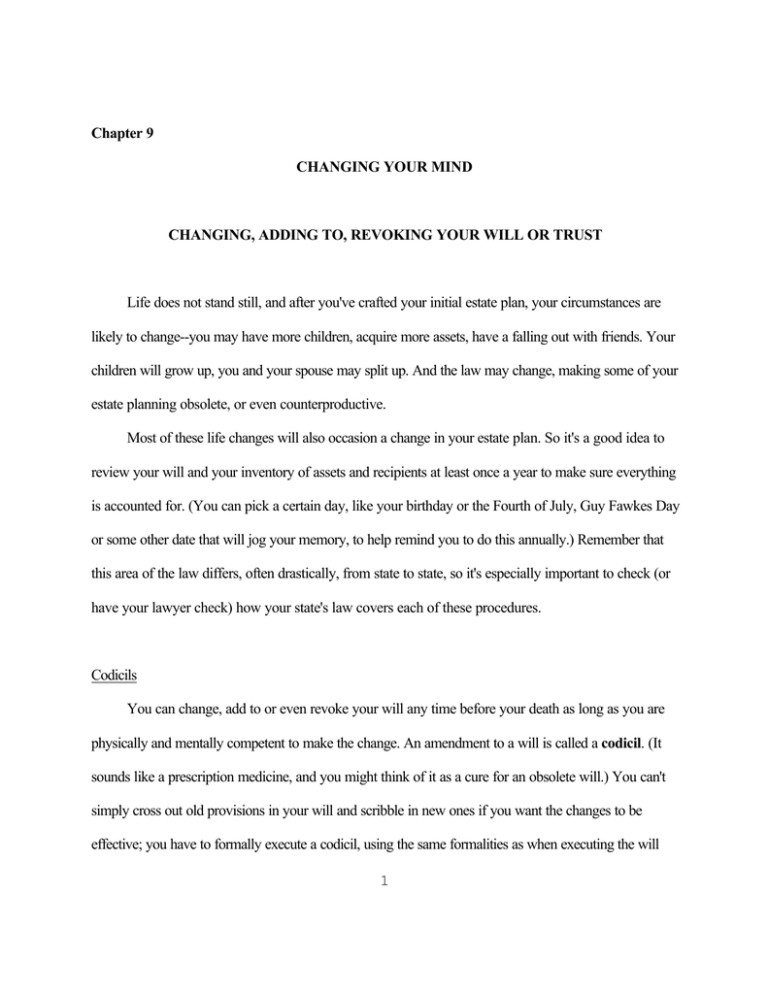Chapter 9: Changing Your Mind
advertisement

Chapter 9 CHANGING YOUR MIND CHANGING, ADDING TO, REVOKING YOUR WILL OR TRUST Life does not stand still, and after you've crafted your initial estate plan, your circumstances are likely to change--you may have more children, acquire more assets, have a falling out with friends. Your children will grow up, you and your spouse may split up. And the law may change, making some of your estate planning obsolete, or even counterproductive. Most of these life changes will also occasion a change in your estate plan. So it's a good idea to review your will and your inventory of assets and recipients at least once a year to make sure everything is accounted for. (You can pick a certain day, like your birthday or the Fourth of July, Guy Fawkes Day or some other date that will jog your memory, to help remind you to do this annually.) Remember that this area of the law differs, often drastically, from state to state, so it's especially important to check (or have your lawyer check) how your state's law covers each of these procedures. Codicils You can change, add to or even revoke your will any time before your death as long as you are physically and mentally competent to make the change. An amendment to a will is called a codicil. (It sounds like a prescription medicine, and you might think of it as a cure for an obsolete will.) You can't simply cross out old provisions in your will and scribble in new ones if you want the changes to be effective; you have to formally execute a codicil, using the same formalities as when executing the will 1 itself. Of course, it's vital that such codicils be dated so the court can tell whether they were made after your will. The codicil should be kept with the will. As the same mental ability and freedom from undue influence is required for a codicil as for a will, if the changes are substantial, it may be advisable to write a new will. It's a good idea to check with your lawyer before revising or revoking your will. You also have to watch out for ademption, which is what happens if you will something (say, your antique automobile) to someone, but by the time you die, you no longer own that auto. In this case, the gift would fail completely; the beneficiary wouldn't be entitled to another vehicle. (A good will avoids this by using language like, "I give my antique Rolls Royce, to my son-in-law, Joe, but if I don't own it, at the time of my death, I give him or her a choice of any automobile I do own at the time of my death.") Tangible personal property memoranda A tangible personal property memorandum (or direction) is a separate handwritten document that is incorporated into the will by reference. (This means that the will says something like "This will incorporates the provisions of a separate Tangible Personal Property Memorandum...." Then the TPPM is regarded as part of the will.) The TPPM is dated and lists items of tangible personal property (e.g., jewelry, artwork, furniture) and the people you want the property to go to. Many states recognize the validity of such a signed instrument. Some require it to be in existence at the time the will is signed. For those states that do not give full effect to this type of document, the executor usually will attempt to comply as closely as possible with your desires, as indicated by the TPPM. In those states, TPPMs are similar to precatory gifts in your will or trust. If you don't direct that a certain asset go to a certain beneficiary, but merely express a hope, wish, or recommendation that the asset be given, most courts would hold that the language creates a moral obligation but not a legal obligation. If you do use a TPPM, it's important to remember to make provisions for what happens to any of 2 the property listed if the person who is in line to receive it should die before you do--and you neglect to adjust the TPPM accordingly before your death. To revise a TPPM, you write "revoked" across each page of the old one, sign each page, and include the date of revocation. Attach the new TPPM and make sure it's kept where it will be found after your death. If you have incorporated the TPPM in your will by reference, many states require you to amend the will to incorporate the amended document. Revoking a will Sometimes when you undergo a major life change, such as divorce, remarriage, winning the lottery, having more children, or getting the last child out of the house, it's a better idea to rewrite your will from scratch rather than making a lot of small changes through codicils. It's best to do this by executing a new will that states that it revokes the old one. There are two schools of thought about what to do about the old will. Some lawyers recommend that you destroy it, if possible in front of your lawyers and the witnesses of your new will. Others do not recommend destroying prior wills: A prior will is often very useful in avoiding arguments that there was undue influence. If there are a number of wills that have similar provisions, prior wills are often very good evidence. When you write a new will, be sure to include the date it's signed and executed, and put in a sentence that states that the new will revokes all previous wills. Otherwise, the court is likely to rule that the new one only revokes the old where the two conflict--which could cause problems. If you keep an unsigned copy of the old will with the new one, write on each page "revoked, superseded by will dated ____." This provides a record in case any questions arise. If you fail to change or rewrite your will to account for changes in your life, the courts will give as much effect to your old will as possible. Some changes may be accommodated by the law, regardless of 3 what your will says. For example, if you have a new child and don't explicitly say you don't want her to inherit anything, then the law may give that child a share of your estate. Likewise a new spouse. In some cases, though, assets that aren't accounted for go into what's called the residuary estate (see chapter three for more). That's what's taken care of by a paragraph of most wills that says that you leave everything else to your spouse, or St. Jude's hospital, or whomever. It's more likely, though, that you want that hot new roadster you bought last year to go to your 25-year-old son rather than to your 70-year-old widow, and that's why it's best to modify your will periodically to account for such after-acquired assets. Amending a trust Trusts are generally easier to amend than wills, requiring fewer formalities. You modify a trust through a procedure called amendment. You should amend your trust when you want to change or add beneficiaries, change disposition of assets in the trust, or change trustees. You amend a trust by a writing, called an amendment to the trust, explaining the changes, specifying the new additions or deletions, signed by you and dated. You should not detach a page from the trust document, retype it to include the new information, and put it back in, because this could invite a legal challenge from a disgruntled nonbeneficiary or require a court's construction of the trust. You don't have to write a formal amendment to the trust to add property to it, because a properly drafted trust will contain language giving you the right to include property acquired after the trust is drafted. You simply make sure the new property is titled as being owned by the trust and list it on the schedule of assets in the trust. You do have to amend the trust if the newly acquired property is going to a different beneficiary than the one already named in the trust, or if the trust has more than one beneficiary listed. 4 It is awkward to revoke, not amend, your trust when making major changes, because then you must transfer all assets out of the name of the trust back into your name, and then retransfer them to the new trust. It's better to restate the trust in its entirety, with all changes in restated version. Occasionally, when a new trust has replaced an old one, someone will slip up and fail to transfer all the assets in the first trust to the new one. Restating a trust makes sure that all the assets remain in the trust and new ones are added. If you do revoke a trust, you do so by a writing signed and dated by you, unless some other method is specified in the trust instrument. When you create a new trust to replace the revoked one, state at the beginning that it supersedes the trust dated________signed by you. Most lawyers say you should review your trust every year to assure that it still meets your needs. You should also go over it with your lawyer or other professional advisors every three to five years. If you have a will that pours over to the trust, add a clause in the pour-over provision that says "including all amendments made by me from time to time." Then, it will be unnecessary to make a new will or codicil each time you amend the trust. Special considerations for living trusts If you have a living trust, remember that if you acquire property in your own name and die before you can put it into your living trust, the property will automatically become part of your probate estate, and will have to go through probate. If your will is properly drafted, such property will be picked up by your will's residuary clause (see chapter three) and pass to the beneficiaries named there. That's why it's essential to have a will even if you have a living trust. Other estate planning documents you might want to keep up-to-date include IRAs, insurance policies, income savings plans such as 401(k) plans, government savings bonds (if payable to another person), and retirement plans. You should keep a record of these documents with your will, and update 5 them as needed when you update your will. 6 Sidebar DO I NEED TO UPDATE MY ESTATE PLAN? A CHECKLIST Ask yourself if any of these changes have occurred in your life since you executed your will or trust. • Have you married or been divorced? • Have relatives or other beneficiaries or the executor died or has your relationship with them changed substantially and no provision is made in your will or trust for this contingency? • Has the mental or physical condition of any of your relatives or other beneficiaries or of your executor changed substantially? • Have you had more children or grandchildren, or have children gone to college or moved out of, or into, your home? • Have you moved to another state? • Have you bought, sold, or mortgaged a business or real estate? • Have you acquired major assets (car, home bank account)? • Have your business or financial circumstances changed significantly (estate size, pension, salary, ownership)? • Has your state law (or have federal tax laws) changed in a way that might affect your tax and estate planning? If you do update your estate plan, you should also update your final instruction and will with the addresses and phone numbers of beneficiaries, trustees, executors and others mentioned in estate 7 planning documents. It will make settling the estate much easier. Click here to go to Chapter 10 8
